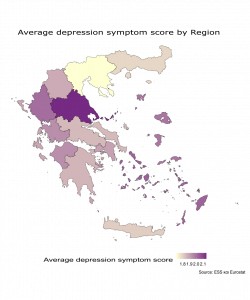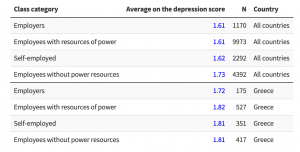A study from a group of Greek researchers shows that class and geography can dictate your mental health. The European Social Survey, presented by the National Centre for Social Research (NCSR) at Panteion University, underscores a clear link between social and economic inequalities and mental health challenges. The data, particularly concerning for Greece, paints a troubling picture.
Covering 24 European countries, the survey sheds new light on how class stratification and geographical disparities contribute to symptoms of depression, offering a critical perspective on the interplay between inequality and mental well-being.
Greece’s “sad” first place
As far as Greece is concerned, the myth of the happy and outgoing Greek who enjoys life seems to be far from reality, as, according to the data presented, Greece has the highest average rate of depressive symptoms in Europe.
However, the other Mediterranean countries also have high rates of depressive symptoms, despite the common perception that people living in these countries have a higher level of positivity and feelings of joy compared to those in the northern countries.
Within Greece the regions of Thessaly, South Aegean, Epirus and North Aegean are those in which participants reported the most frequent symptoms of depression, according to the survey.
Contrary to popular perception, island regions are more likely to experience depressive symptoms than mainland Greece, with the exception of Epirus, the second poorest region in the country (after the North Aegean) and Thessaly, which has experienced a number of major natural disasters in the period during which the survey was conducted.

Greece is first in loneliness: A warning for Mental Health
Our country is also at the top in terms of loneliness, one of the most critical indicators of mental well-being.
In addition, the indicator concerning the frequency of feeling sad is also of interest. In this indicator, Lithuania is in first place, with an average of 1.8, followed by Greece with 1.7, then Slovakia, Spain and Portugal.
In contrast, Finnish citizens reported the least frequent levels of sadness, stating that they felt this emotion less often than other Europeans. These data highlight national variations in emotional well-being and the influence of social and cultural factors on citizens' psychology.
The relationship between social class and mental health
A notable finding of the European Social Survey (ESS) is that mental health is not just a personal issue, but a reflection of wider social and economic inequalities.
The data analysed by the research team of George Bithymitri (National Centre for Social Research), Nikandros Ioannidis (CUT) and Yannos Katsouridis (University of Nicosia) shed light on the link between social class, regional development and mental health.
The research team used a social class typology based on Erik Olin Wright's theory. Participants were divided into four groups: employers, self-employed, employees with power resources, and employees without power resources.
The findings are revealing: The working class, i.e., employees without power resources, exhibit the highest levels of depressive symptoms, while employers exhibit the lowest. In Greece, however, the differences are less pronounced among the other classes, which demonstrates the specificity of our country in the association between class category and mental health.

The researchers also found that even employers - a traditionally less vulnerable group - are more psychologically burdened in areas of declining growth, although the working class remains the most burdened.
Findings as tools for policy making
We can therefore see that the findings of the European Social Survey show that mental health is directly related to the class position of the individual and the inequalities found within each society. This raises critical questions for social policy making, highlighting the need for strategies that reduce these inequalities and enhance the mental well-being of individuals.
With mental health being particularly influenced by social and geographical factors, it is clear that it is not an issue that is solely the responsibility of the individual but is the result of a combination of economic, social and geographical factors.





